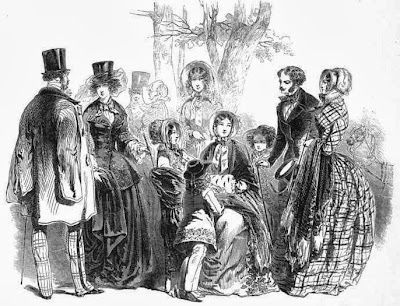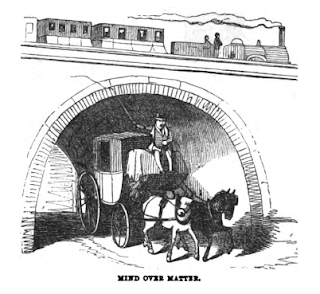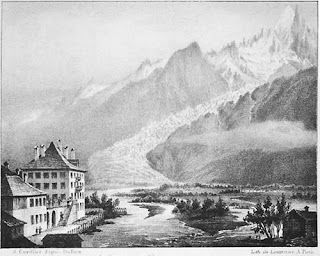Why I love the 1840s
Until now, readers of my work will be familiar with a narrow time period beginning in 1893 (the first chapter of Crowley’s Rival) and ending in 1897 (most of The Only Genuine Jones). This period interests me as a climber because it stands at an important crossroads in the history of mountaineering. Prior to the 1890s, mountaineering in the UK was at best seen as lightweight practice for ‘the real thing’ (Alpine climbing); but during that decade it flourished and became an important branch of climbing in its own right.
However, interesting as the 1890s are from the mountaineering side of things, I find them slightly dull when it comes to the broader historical and social context. You will notice that my previous two books don’t dwell on that broader context; most of the historical detail is to do with the climbing community, because that is where the interest lies for these stories.
In the 1890s we have colonial wars, comparatively minor developments in science and technology, and a number of relatively ordinary economic crises. In Europe, at least, there are no sweeping revolutionary events to speak of. The discovery of the X-Ray would come to have dramatic consequences in the century to come, but at the time it barely made a ripple outside scientific circles. Increasing numbers of automobiles on the roads were at best curiosities for the general public and would not begin to make a serious impact on transport for the masses for a very long time; equally, innovations such as the telephone and moving pictures would not affect the majority of Britons for decades. This was the Belle Epoque: a period of relative stability and prosperity, for the upper classes at least. The working classes continued to suffer, but many of the battles they had fought for a hundred years had already been won.
Rewind fifty years to the 1840s, the decade in which I have decided to set my next two books.
This was a decade of dramatic change that penetrated from the very top to the very bottom of the social order. The continent of Europe had long suffered from food shortages and price increases (a symptom of increasing population), but now the underclasses rose up in revolution against the conservative establishment, and very nearly succeeded in toppling it in many countries. As usual, France was the center of this conflagration, and once again the Parisians overthrew their monarchy and implemented a new system of government. Once again there were rebels barricaded in the streets, fired upon by cannon and surrounded by armies.
This era saw the birth of Communism, the flowering of Nationalism, the remarkable domino effect of nation after nation standing up and demanding basic rights we now take for granted. Thousands died in the revolutionary wars of 1848, and although some countries were granted constitutions, very little of substance was achieved in the long run. Many Europeans continued to live short lives of abject misery and die in squalor.
Britain escaped a similar violent revolution by a hair’s breadth.
The revolutions in science and technology were scarcely less significant. The telegraph system spread throughout Europe and by the end of the decade was affordable enough for most people to use. For the first time in history, messages that would once have taken days to transmit could now be sent in a matter of minutes. International news was reported in a manner that must have seemed instantaneous. To those alive at the time, it seemed as if the world was quite literally shrinking day by day.
This was the era of the railway, particularly in the middle of the decade when railway mania gripped Britain and many middle class families invested all their savings in the railways, only to lose everything when the bubble burst. Train travel became affordable and widespread. The old wheezing network of stagecoaches and coaching inns was replaced by a clanking, gleaming giant in a few short years. The train penetrated to every corner of England. While many embraced this new and modern form of transportation, yet more were afraid of it and distressed by the speed at which the British countryside was despoiled by the construction of thousands of miles of railway track. To make matters worse, railway accidents were extremely common in this era. Fear of sudden industrial change was compounded by fear of these alarming mechanical beasts that had suddenly invaded the land.

Rapid population growth, coupled with industrialisation and changing methods of making a living, wreaked vast change on the British countryside. Huge numbers of people moved to the cities to try to find work in factories. While the countryside was being carved up by railways, the cities expanded at a phenomenal rate, consuming ancient villages and countryside in a land of soot and smog. Outbreaks of cholera cut swathes through the cramped and overpopulated cities, killing thousands.
In Britain, the middle classes became wealthy as more and more of them invested their money in the new industrial world. Power trickled down the social order. Although troubled by the grumblings of the lower classes, the ruling elite continued to live more or less as they always had. The older generation often shoved their heads firmly in the sand, refusing to accept the new modern world which was unfolding around them at an increasingly rapid pace. It was common in this decade for the nostalgic to turn their rose-tinted gaze to the early years of the 19th century, before industrialisation transformed the land, when the rule of the upper classes was incontestable, when young officers made their names and fortune in the wars abroad. I find it incredible that terrible events such as the rampage of Bonaparte across Europe can become the subject of nostalgia only forty years later, but such are the strange tricks that rapid change can play on a nation’s consciousness.
The fledgling sport of mountaineering had not yet grown wings (even the term ‘mountaineering’ had scarcely been invented). For most, Mont Blanc was the beginning and end of mountain climbing. In the Alps, British adventurers still focused on science and exploration first, climbing second; but a growing class of explorers were beginning to see the potential of the Alpine world, to realise that hundreds of mountains awaited first ascents. By the late 1840s the conditions were right for a revolution in mountaineering. The lyrical science of James Forbes and the showmanship of Albert Smith helped to ignite a fire that would only continue to grow for the next hundred and fifty years. In 1848 we stood on the brink of a Golden Age of Alpine exploration–a period ending in 1865 in which all of the major peaks of Alps are climbed. It was a period of adventures and legends the like of which history has never seen before or since.
This post has only really scratched the surface of the 1840s, but hopefully you can begin to see why I’m so enthusiastic about the decade. The opportunities for a storyteller are tremendous … yet in modern fiction the 1840s seem to be relatively neglected. When we collectively think about the Victorian era, most people think about the latter part of the 19th century; the dramatic middle of the century is visited comparatively rarely.
I’m very excited about the journey I have begun with The Atholl Expedition, and I hope my readers will enjoy the 1840s as much as I do.
Alex Roddie Newsletter
Join the newsletter to receive the latest updates in your inbox.







